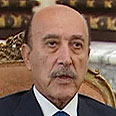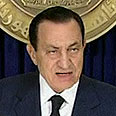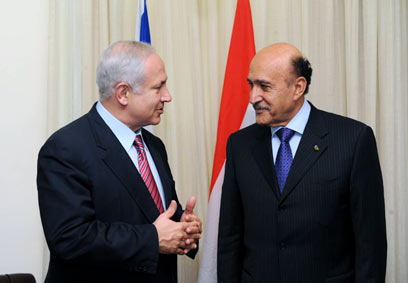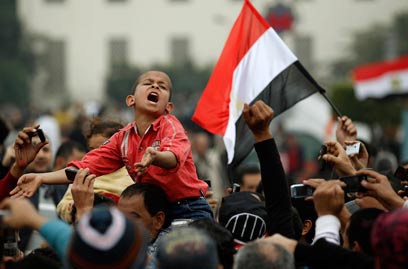

Some of the documents were written in 2008, when the president's son, Gamal Mubarak, was still seen as the person with the highest chances to succeed his father.
After Mubarak's Egypt has been accused of cooperation with Israel against Hamas, the documents present more proof that the Egyptians – led by Suleiman – sought to tighten the blockade imposed on the Palestinians in the Gaza Strip.

Barak with Suleiman (Photo: Ariel Hermoni, Defense Ministry)
The diplomatic cables, sent from the US embassies in Cairo and Tel Aviv, reveal the close cooperation between Suleiman, the United States and the Israeli government, as well as diplomats' great interest in President Mubarak's likely successors.
David Hacham, a senior Defense Ministry advisor, is quoted in the documents as telling the American diplomats at the Tel Aviv embassy that a delegation led by Defense Minister Ehud Barak had been impressed by Suleiman. According to the memos, Hacham was "shocked" by Mubarak's "aged appearance and slurred speech."
According to a cable dated August 2008, "Hacham was full of praise for Suleiman, however, and noted that a 'hot line' set up between the Ministry of Defense and Egyptian General Intelligence Service (headed by Suleiman) is now in daily use.
"Hacham noted that the Israelis believe Suleiman is likely to serve as at least an interim President if Mubarak dies or is incapacitated." Tel Aviv diplomats added, "We defer to Embassy Cairo for analysis of Egyptian succession scenarios, but there is no question that Israel is most comfortable with the prospect of Omar Suleiman."
According to the document, the Israelis' most fundamental talks in Egypt – during their meetings with Mubarak, Suleiman and Defense Minister Mohamed Tantawi – were with Suleiman.
As for the "hotline" opened between Cairo and Tel Aviv, Hacham said he sometimes spoke to Suleiman's deputy, Mohammed Ibrahim, several times a day.
Suleiman said: Send troops to Philadelphi
According to the documents, the Telegraph reported, Suleiman once suggested that Israeli troops would be "welcome" to invade Egypt to stop weapons being smuggled from the Sinai Peninsula to Hamas terrorists in neighboring Gaza.
"In their moments of greatest frustration, Tantawi and Suleiman each have claimed that the IDF would be 'welcome' to re-invade Philadelphi, if the IDF thought that would stop the smuggling," the cable said.

Suleiman and Netanyahu. 'Hotline' (Photo: Amos Ben Gershom, GPO)
Suleiman, according to the leak, wanted Hamas "isolated" and thought Gaza should "go hungry but not starve."
"We have a short time to reach peace," he told American diplomats. "We need to wake up in the morning with no news of terrorism, no explosions, and no news of more deaths."
Several days after the mass protests against Mubarak broke out, the Egyptian president named Suleiman as his deputy. It was the first time that Mubarak appointed a vice president since taking office 30 years ago.
Ahead of the negotiations launched Sunday between Suleiman and Egypt's opposition movements, the opposition suggested that Suleiman would assume Mubarak's authorities until the September elections, but the offer was rejected – on the backdrop of differences of opinion in the opposition, among other things.
Some of the opposition leaders voiced their strong objection to the option that Suleiman would head a transit government – a move supported by the United States, Britain and other Western countries.
Former International Atomic Energy Agency chief Mohamed ElBaradei, one of the opposition leaders, defined such a move as "a great obstacle to the talks". Egypt's biggest opposition movement, the Muslim Brotherhood, threatened Monday to quit the talks with the government if it failed to meet their demands.
Diskin warned: Egypt losing Sinai
The cables published Monday night reveal addition details from talks held between American diplomats and their Egyptian and Israeli counterparts about the developments in the region.
In another document from August 2008, which was written after a visit by Barak to Egypt, Hacham was quoted discussing the talks which focused on the negotiations aimed at securing the release of kidnapped soldier Gilad Shalit.
"The Israelis think Hamas feels that the prisoner exchange with Hezbollah had strengthened their hand in terms of how many and what kinds of prisoners Israel would be willing to give for Shalit," the cable said.

In another meeting documented in the cables, in November 2007, Shin Bet Director Yuval Diskin warned that Egypt's rule in the Sinai Peninsula was diminishing. He contended that Cairo sought to avoid conflict with its Bedouin tribes in the area, and had less control over security officials in Sinai.
This comment appears more relevant than ever, after Bedouins took over main roads in Sinai due to the riots in Egypt, and Israel was forced to let Cairo send a significant military forces to the area for the first time since the peace treaty between the two countries was signed.
Diskin complained at the time that Egypt was not doing enough to prevent arms smuggling to Gaza, adding that ammunition may be transferred to the Strip through Yemen and Libya, in addition to Sudan.
He said that sources among the smugglers told Israeli elements that Egypt was letting them operate as long as their actions did not generate any terrorist activities on Egyptian soil.
According to the cable, Diskin described how Israel had sent a delegation to Egypt the previous month to look into information about the release of a smuggler who supplied equipment for a suicide bombing in Israel.
"After initial denials, Diskin said the Egyptians admitted that he had been released for fear of causing problems with the Sinai Bedouin tribes. In Diskin's view, the central government in Egypt has grown considerably weaker (as Mubarak has grown older), making it harder for them to control their own security forces in peripheral areas such as Sinai," the cable said.
The Associated Press contributed to this report
- Follow Ynetnews on Facebook















